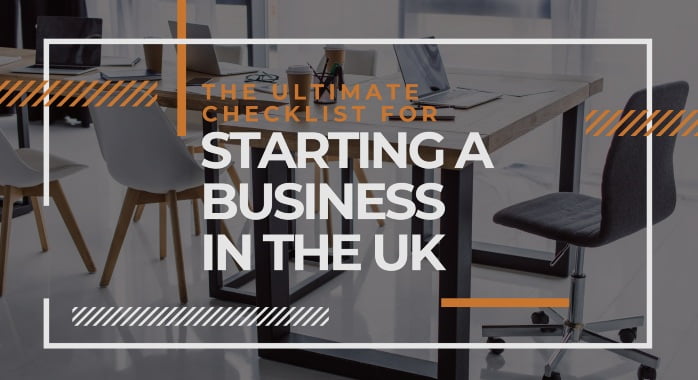Having your own business gives you the freedom to be your own boss and do something you’re passionate about for a living.
But the hardest part of running your own business is knowing exactly where to start and setting yourself up for success.
That’s where we’re here to help. If you’re ready to start your own business, we’ll make sure you set up strong foundations with our ultimate checklist for starting a business in the UK.
1. Generate a good idea
Before you set up a business, you need an idea. This is often easier said than done unless you’re one of those rare entrepreneurial souls that can reel off business ideas all day long.
Now, we can’t put ideas in your head – but if you’re on this checklist, we’re going to make an assumption that there’s already a solid idea or some wheels turning there anyway.
But what makes a business idea a good one is to make it something you’re passionate about. If you have an idea for something that might be profitable, but you don’t care about it, you’re not going to put in the time and effort to make it a success.
Starting A UK Business?
Get rid of the confusion and always know what to do next with Startup Hive, the step-by-step platform created by the Business4Beginners team.
- FREE Step-By-Step Platform
- FREE Company Formation
- FREE Bookkeeping Software
- FREE Bank Account
- FREE Domain Name
- FREE Email Platform
- Plus Much, Much More!

Join today for 100% FREE access to the entire Plan & Establish phases, taking you from validating your business idea through to setting it up, getting your accounts sorted, and creating a website.
“Excellent guide to build your business”
“The perfect starting point”
“Incredibly simple and intuitive to use”
Startup Hive is your trusted companion as you look to turn all of your business dreams into reality. Join today for free.
—
2. Create a minimum viable product to test the market
Once you’ve got your idea, it’s time to do some research into your market and audiences before you invest all your time, money, and energy into launching the business. It’s basically a safety check to make sure this is a good idea.
To do this, you need to answer some of the following key questions:
- Is your market doing well?
- Is there a big demand in your market for your services?
- What is the competition like?
- What are your competitors doing well?
- What are your competitors failing at?
- Can you compete with them?
- Is there a gap that no one is catering for?
- Who are your customers?
- How will you win customers over?
To get these answers, it’s a good idea to set up surveys, questionnaires, or even focus groups if you have the time and money to do so.
If not, get honest opinions from family, friends, and strangers to get their thoughts. You’ll learn more than you might think.
3. Come up with a USP
A USP is a Unique Selling Point. It’s basically the thing that makes your product or company stand out from the competition and the reason that customers would choose you over others.
For example, a USP could be that you:
- Are an interior decorator that also offers carpentry services;
- An artist that works exclusively with recycled mediums;
- A caterer that specialises in gluten-free foods;
- Have over 20+ years of experience in a particular field.
Whatever it is, this will become your hook. When you’re explaining your business in two sentences, it will be the thing you use to draw others in.
4. Create a business plan
Now that research and big thinking are out of the way, it’s time to get serious with a business plan. And for those of you who think that you can get away without one or that they’re just an extra piece of admin to complete, let us remind you of one thing: almost 1 in 5 new businesses fail in the UK each year.
Although sometimes this is just down to bad luck (or bad market turns), the biggest reason that new businesses fail is that they fail to make a business plan. It’s like that saying goes, ‘failure to prepare is preparing to fail’. Honestly, we couldn’t agree more.
Writing a business plan shouldn’t be as daunting as you may think. It’s basically a way to outline what your business is and what your goals are, as well as:
- Your products and how you are going to market them;
- Who your customers and competitors are;
- What your industry looks like;
- Your financial information and needed funding.
Lucky for you, we’ve created a step-by-step guide to creating a business plan that you can follow here to have yours completed in no time.
But first, just one extra bit of incentive:
Companies with a business plan grew an average of 30% faster than those that didn’t. In addition, they were also twice as likely to get investments or secure loans than companies without one.
5. Decide a company structure
Now you have your idea and your plan, it’s time to start getting into the boring technical details. The first of which is to decide on the type of company structure that you are going to use for your business.
This is an important selection, as each type of structure will have its own regulations and rules to follow (as well as different instructions for setting up!). In the UK, the main type of companies are:
- Sole trader;
- Partnerships;
- Limited company.
A sole trader is one of the most common types of company structure as it’s the easiest to set up and run (with no registering fees!). Under a sole tradership, you will have full ownership of your company, which is legally tied to you. So, the downside here is that you will be legally responsible for any debts you acquire.
A partnership is similar to a sole tradership, except you will choose to jointly own a company with a business partner. This will give you shared access to the responsibility of the company.
A limited company is an incorporated company, which means that it classes as its own legal entity. Any property or debts belong to the company, not you, giving you a lot more added protection. You can also get better tax relief as a limited company, but you will be doing a lot more paperwork to get running.
When choosing a structure, remember that this can be changed later down the line. A lot of companies start as sole traders, then choose to change into a limited company later down the line.
6. Choose a name
This one is a fun one – choose your business name!
This can be anything you want (within reason). A lot of sole trader businesses use your actual name, such as John Smith Plumbing, to create a personal touch. But that doesn’t mean you have to follow in the same footsteps.
Just remember, as it’s the first piece of information that customers get about your business, you might want to make sure that it reveals an accurate picture of who you are and what you do.
You can get tips on how to come up with a catchy name for a business.
As a general rule, we’d recommend:
- Avoiding rude or offensive names. You’re here to make customers, not get banned off the high street.
- Not choosing a name that’s already taken. Be original and distinctive!
- Keeping it easy to remember. ‘Mr John the Excellent Plumber Man Of Wonderous Pipes’ is a unique name, but it’s a hard one to remember.
If you want to stop anyone else from using your name, you can register to get it trademarked.
Once you have a name, it’s also recommended that you register a domain name. This is basically the address of your website (for example, ours is Business4Beginners.co.uk). Registering it early will stop others from using your name as a website when you are ready to build your own (which we’ll cover later).
7. Form, or register, your company
You have a name and a plan. Let’s now make this official by forming your limited company, or setting your business up as a sole trader.
If you’re forming a limited company, you will need to:
- Appoint directors (usually you);
- Allocate shares (which can be 100% yours);
- Create the official documents which set out your company name and shareholders;
- Complete your application form (you will need a registered office address for this one!).
The easiest way to complete this is to leave it in the hands of company formation agents, who will take care of all the little details and even provide a registered office address if you’re working from home and want to protect your privacy. Get started with some of the best formation agents in the UK.
Top-Rated Company Formation Agents
| Formation Agent | Cheapest Package | Add On Services | Our Rating | Review | Official Site |
|---|---|---|---|---|---|
 | £12.99 | Excellent | 9.4 | Read Review | Visit Website |
 | £11.99 | Excellent | 9.4 | Read Review | Visit Website |
 | FREE | Average | 9.4 | Read Review | Visit Website |
If you’re registering as a sole trader, this process is a lot simpler. Just:
- Register as a sole trader with the HMRC;
- Make sure you’re registered for self-assessment.
Yep, pretty simple. Just make sure you don’t forget to register – and know how to pay your taxes as a sole trader!
Which Company Formation Package Is Right For You?
Answer 5 multiple choice questions to get a personal recommendation:
8. Get a bank account
Keeping your business and personal finances separate is the most effective way to manage your business finances. So, once you’re registered and or formed, we’d recommend creating a business bank account.
And although you may be tempted to just open up a separate personal account, remember that most accounts have that added caveat that they are “not for business use”. So, it’s best to be on the safe side here.
Plus, having a business bank account will make paying your taxes and claiming back any expenses all the easier.
9. Secure funding and finance
Back when you made a business plan (we told you they were important!), you will have outlined how much money you need to get started and where you plan on getting it from. Now is the time to make this happen.
If you choose to register as a sole trader, bear in mind, it can be harder to get funding from banks. So if you need a bit more start-up money, you might want to consider taking out personal loans instead to kick things off.
10. Get your accounts in order
No matter what your business is or what you do, there’s one thing that all businesses will have in common. And that’s keeping records of, well, pretty much everything.
Whether you’re a sole trader or a limited company, these records are used to keep track of your cash flow and revenue, calculate and pay your taxes and ultimately protect your business.
When it comes to sorting out your accounts, you can either do it all yourself or get help from an accountant. If you want the option with less stress and worries, we’d recommend taking a look at our recommended accountants to get you started.
EXCLUSIVE OFFERS – Save On Your Accountancy Costs
However, when it comes to your bookkeeping, we’d always recommend using accounting software to keep your records accurate and secure.
This isn’t the right decade to keep paper receipts or confusing spreadsheets – put them all into a program that takes care of it for you. With loads of great beginner and free accounting software options out there, it would be insane not to.
Which Accounting Software Is Right For You?
Answer 5 multiple choice questions to get a personal recommendation:
11. Get insured
Depending on your business and what you do, there will be certain types of insurance that you have to take out. For example:
- If you plan to have employees, you’re legally required to purchase Employer’s Liability Insurance.
- If you drive a business vehicle, you need to have Commercial Motor Insurance.
- If you have clients visit your premises or carry out work on client sites, you will need Public Liability Insurance.
There are also other insurance types that aren’t required but could be beneficial for your business to take out. For example:
- Professional Indemnity Insurance covers you if a client loses money because you provide negligent advice, services, or designs;
- Legal Expenses Insurance covers business legal expenses or prosecution fees;
- Small Business Health Insurance provides affordable healthcare coverage for you if the worst would happen;
- Personal Accident Insurance protects you if you suffer an injury or accident that forces you out of work;
- Tool & Equipment cover can protect valuable assets and tools that you need to do your job in the event that they are damaged or stolen;
- Building & Contents Insurance protects the physical office or building you work in (even if its your home!) as well as everything in it in the event of any break-ins, floods, or other disasters.
Not sure which insurance you’ll need? Find out more in our guide ‘Do I Need Business Insurance As A Sole Trader?’
12. Create a website

Having a website is a great way to advertise your business and services online – so customers can find you! With nearly everything being digital lately, having a website has gone from being a nice-to-have to being a must-have for business.
According to SmallBusiness, last year, nearly 2 million SMEs didn’t have a website. The estimated cost of not having a website is £173,769 per year in lost revenue, despite the average monthly running cost of a website being less than £18. Now that’s a convincing tale of why websites are important.
Websites can be as simple or as complex as you want them, with as many pages as you need. If you just want a simple page to showcase your USP and provide your contact details, then go for it. If you want a slick-looking website with all your client work as case studies or a working online shop, then that’s cool too.
Creating a website nowadays is a lot easier than you think. There are plenty of website builders that allow you to drag and drop the elements you want in place. You can even sign up to buy a domain name through some of these platforms, giving that extra professional touch.
Take a look at the best website builders for your business here.
When building a website, you might want to consider our top 17 Best Small Business Website Design Tips to make sure that you get the best performance.
13. Set up social media accounts
As well as a website, you might want to set your business up on social media platforms like Facebook, Twitter, or Instagram.
Social media is a great way to reach audiences, and with integrations like Instagram Shopping, can even be a way to sell your products directly.
Our biggest advice with social media is to do your research first. You don’t have to sign up for every platform – just keep it to the ones where your audience is likely to be. You’ll also find more tips about how to market a business on social media here.
Time to win customers & grow
With the above checklist for starting a business in the UK, you’re ready to get your business up, running, and thriving.
If you want a printable PDF version of the checklist, enter your email below:
For any other news, advice, or tips, we’re here for you at Business4Beginners.








